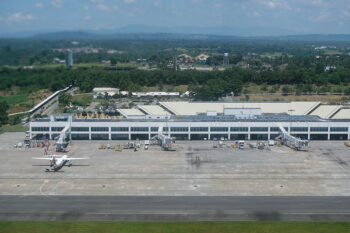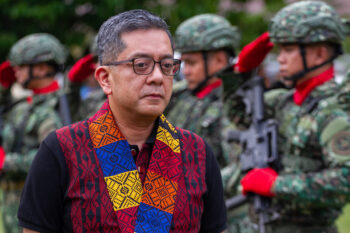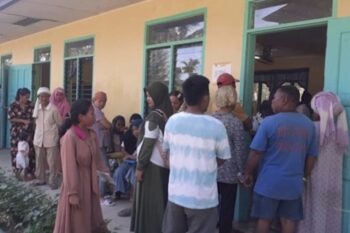DAVAO CITY (MindaNews / 12 June) — Security has always been a critical issue in countries around the world, especially in developing nations. Over the years, terrorism has become more prevalent, and the global community has become more aware of this escalating threat as well as the need to eliminate or, at least curb, these subversive activities that have deep rooted effects. Despite best efforts, the leading countries of the world cannot resolve this continuing threat on their own.
The Philippines has also experienced its fair share of terrorism and is among the most affected countries in Southeast Asia. Devastating events such as the Marawi City Siege of 2017 and countless bombings nationwide over the decades have ravaged the nation. Local subversive groups, such as the Hapilon, Maute group and the Communists Party of the Philippines – New Peoples Army (CPP-NPA), have launched countless attacks which have cost so many lives, including countless innocent civilian souls. International terrorist organizations, such as the Islamic State of Iraq and Syria (ISIS) and Abu Sayaff, have already infiltrated the Philippines and wreaked havoc over the country in the past few decades. As the world, including the Philippines, has become more vulnerable as a result of the current pandemic of COVID-19, security has naturally become a serious concern.
We support the Anti-Terrorism Act of 2020. The time has come for a law that can deliver swift and decisive blows that can crush all manners and forms of terrorism because it undoubtedly breeds fear and contempt, shaking the very fabric of society. The law provides a strong legal backbone for law enforcement to carry out proper action while exacting accountability and responsibility. Regardless of stage of execution, stiffer punishment has also been meted out to fit the seriousness of the crime, which now includes participation in the plotting of terrorist acts, unlike the Human Securities Act of 2007.
We need the Anti-Terrorism Act to facilitate countering terrorism effectively since the threat of terrorism is continuing and mutating. As a result, anti-terrorism measures have become a priority, especially since terrorist activities create deeply rooted fear, suspicion and contempt as well as instability. On the whole, these effects could be considered far more devastating than the actual physical devastation. We must find a way to maintain peace and development in the Philippines, especially in Mindanao and the Bangsamoro Autonomous Region in Muslim Mindanao (BARMM) to achieve sustainability and better quality of life in general.
As a responsible member of the global community, the Philippines should pass the Anti-Terrorism Bill into law. In fact, each country has the obligation to effectively deal with terrorism on its own, especially within its borders. It is vital that every country create legislation which will serve as the foundation for such decisive actions needed. United Nations Security Commission Resolution 1624 (2005) directs countries to adopt necessary and appropriate measures in accordance with their obligations under international law to: (a) Prohibit by law incitement to commit a terrorist act or acts; (b) Prevent incitement to commit a terrorist act or acts; and (c) Deny safe haven to any persons with respect to whom there is credible and relevant information giving serious reasons for considering that they have been guilty of incitement to commit a terrorist act or acts.
As such, the directive provides that “these measures include, in some cases: a) express prohibition of incitement to commit terrorist acts in criminal legislation; b) laws prohibiting incitement generally; c) accessory or inchoate offenses, such as aiding, abetting, counselling, facilitation, inducement, instigation, organization, participation, preparation, persuasion, provocation and solicitation.”
Despite the controversy over the bill, it appears that even leaders connected to the justice system and law enforcement believe in the necessity of the controversial bill. Senate Minority Leader Franklin Drilon, who is a former Justice Secretary, even voted in favor of the bill. Former Police Chief and current Chair of the Senate Defense Committee, Senator Panfilo Lacson, sponsored the bill and assured that legal safeguards have been included even though there have been concerns as to the legalities of certain provisions, such as, but not limited to, Section 25, which grants Anti-Terrorism Council (ATC) the power to designate who is a terrorist, and Section 30, which specifies the rights of persons under custodial detention. Criticism over the bill should likewise be tempered since remedies before the courts are readily available to ensure compliance with the mandate of the law, especially the Constitution.
A major concern among the Muslim community is the classification or labeling of Moros as terrorists and the discrimination relating thereto. Sectors of the Muslim community fear that even gatherings including those for worship may be considered acts of terrorism. However, there should not be any worries since intent to commit terrorism through any of the acts proscribed or deliberate in the bill is the key element in the classification of activities as terrorism. Basically, under the bill, if the activity is “not intended to cause death or serious physical harm to a person, to endanger a person’s life, or to create a serious risk to public safety,” then it is not deemed terrorism. Freedom of speech is still protected as advocacy, protest, dissent, and other analogous exercises of civil and political rights are not deemed terrorism.
Another worrisome issue regarding the bill for some, including Muslims, is regarding detention without judicial warrant of arrest for up to a fourteen (14) day period subject to an extension of ten (10) days upon written authorization and review by the ATC. What critics fail to consider is that other countries have even more stringent periods. For example, Malaysia, an Islamic State, allows for an extension of up to two (2) years on arrests without warrant while the Maldives and Singapore allows indefinite extension as terrorism is a threat to national security.
As there is a clear and present danger in what terrorism can do to the Philippines, we need to strike a balance between viable measures to protect national security and protection of human rights. Although the Anti-Terrorism Act is necessary, it may not be sufficient since law enforcers cannot fight terrorism alone. We must also do our part to address terrorism while being vigilant in the protection of human rights. We must ensure that there is proper implementation of the controversial law. We also need a long-term comprehensive approach that involves effective governance, recognition of our cultural and religious diversities as well as a continued safe space for political and religious dialogue.
(MindaViews is the opinion section of MindaNews. ‘Bangsamoro Speaks’ is open to any Bangsamoro who wants to speak up on any issue affecting the Bangsamoro people. Datu Mussolini Sinsuat Lidasan, Executive Director of Al Qalam Institute of the Ateneo de Davao University, is a Member of Parliament in the Bangsamoro Autonomous Region in Muslim Mindanao)
References:
- P&L Law Services. (June 1, 2020) The Anti-Terrorism Act of 2020: Salient Points of Senate Bill 1083 & House Bill 6875
- Counter-Terrorism Committee Executive Directorate of the United Nations Security Council. United Nations Security Council Resolution 1624 (2005). Compilation of International Good Practices, Codes and Standards.
- Lidasan, Datu M.S. (March 10, 2020) Lidasan: Views on the Proposed Anti-terrorism Act of 2020 (Part 2). Sunstar Davao
- Editorial by the Manila Times. (June 9, 2020) Issues in Anti-Terror Bill Should Be Discussed and Debated Again. The Manila Times.
- Parameswaran, P. (February 26, 2020) What’s in the Philippines’ New Anti-Terrorism Act? A Key Legal Change in the Country’s Counter Terrorism Approach Is Moving Closer To Reality. The Diplomat.
https://thediplomat.com/2020/02/whats-in-the-philippines-new-anti-terrorism-act/
- Gaea, K. C. (February 26, 2020) Senate Approves ‘Monster’ Anti-Terror Bill. Philstar
https://www.philstar.com/headlines/2020/02/26/1996264/senate-approves-monster-anti-terror-bill
- Wikipedia, the Free Encyclopedia. [Last edited May 24, 2020 at 09:55 (UTC)] Islam in Malaysia.
- Lacson, P. (June 4, 2020) To Protect, Not Destroy: Countering Massive Disinformation Campaign Against the Anti-Terrorism Bill. Panfilo “Ping” Lacson Official Site.







